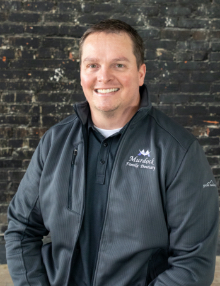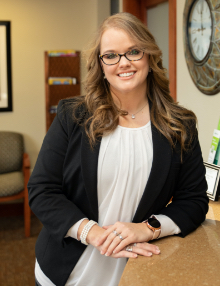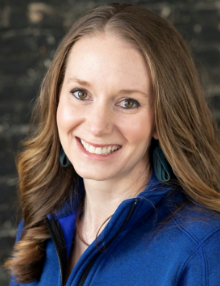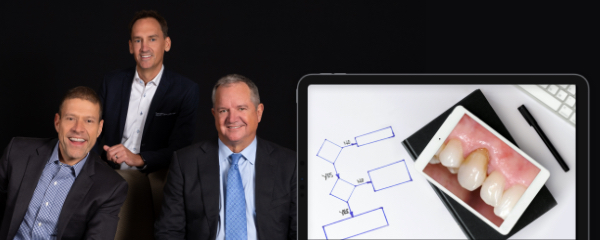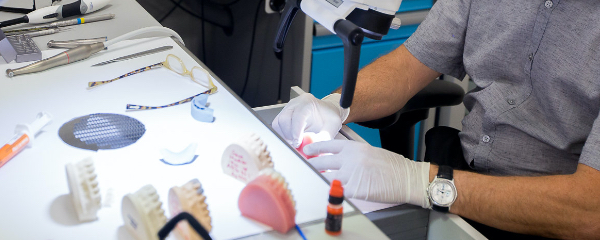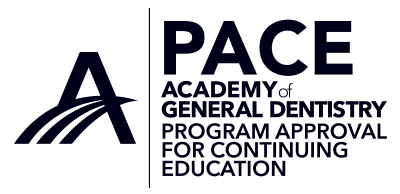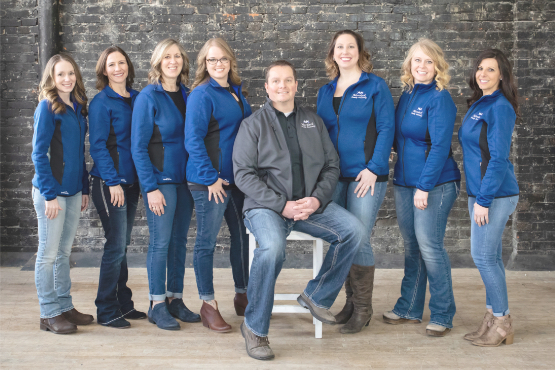
Dr. Casey Murdock was first introduced to Dr. Spear back in dental school, when he would spend hours watching his DVDs about treatment planning and patient outcomes.
"We were learning the basics in school but watching those videos opened my eyes to a much greater purpose and capability that the dentist had vs. the standard concepts you learn while in dental school," he recalls.
When Dr. Murdock became a practice owner a decade later, he returned to Spear Education so he could immerse himself and his team in the same philosophies and concepts that inspired him in dental school.
Find out how Dr. Murdock and his team used Spear learning resources to align and empower the entire practice.
Practice Team
Casey Murdock, D.D.S.
Practice OwnerDr. Casey Murdock’s introduction to Spear started around the same time as many doctors in the Spear community – all the way back in dental school. While learning the basics of ‘bread and butter’ dentistry in class, Dr. Murdock discovered Frank Spear’s videos on DVD – and his perspective on what was clinically possible fundamentally changed.
“We were learning the basics in dental school, but watching [Frank Spear’s videos] opened my eyes to a much greater purpose and much greater capability that the dentist had, versus just the standard concepts you learn at dental school,” he says.
When Dr. Murdock graduated and become a practice owner over a decade later, the same concepts and philosophies that had drawn him to Dr. Spear’s DVDs was now the foundation for an entire dental learning ecosystem.
It wasn’t long before Dr. Murdock immersed himself in everything Spear Education had to offer by becoming a Spear Faculty Club member. “The way Frank Spear integrated his [patient communication and practice management] philosophy with his clinical lectures really sparked my interest. Being able to have some hands-on dental training and in-person lectures versus just watching a DVD… that’s what really got me started with Spear.”
But even as Dr. Murdock visited campus to attend Spear seminars on topics like occlusion and restorative design, there was still something missing when it came to implementing lasting change within the practice.
“ Once I had [completed multiple Spear seminars on campus] I thought, ‘Well, I need my team, I need to bring my team in on the philosophy, too.
Dr. Murdock made the wise decision to invite his core practice team – including his office manager Tiffany Dalton – to attend the Art of Treatment Planning seminar with him on Spear’s Scottsdale campus. The experience proved to be the catalyst the team needed to dive headfirst into Spear team meetings and role-based courses designed to get everyone on the team feeling motivated to help the practice succeed.
“I wanted everybody [in the practice] to be on the same page. I wanted them to know where I was coming from, and not necessarily the procedures or the techniques and materials,” he says, “but more so the philosophy and how I wanted my entire team to be working towards the same purpose.”
Dr. Murdock worked closely with Tiffany to develop a team training framework that aligned and empowered his practice staff to contribute meaningfully to practice goals.
“Going through a lot of the core [Spear] videos together was important for our team. It brought a cohesiveness [we needed]. Everybody knew what was expected of them – [everyone] knew where we all needed to be and what it would take to get there.”
The framework centered around each team member’s individual goals as well as practice goals. This way, each member of the team understood how their own professional development could positively impact the practice, and vice versa.
It wasn’t long before the new team training approach had a noticeable impact on the practice – from the quality of the team’s dental photography to their ability to manage conversations with patients in the practice.
For Dr. Murdock, it was the beginning of an ongoing journey to transform his practice from the inside out – one that is already making an impact on more than patient outcomes.
“I really love dentistry, and I love what I'm able to do for my patients. When everyone [in my practice] is on the same page, I'm able to do more clinical work successfully,” says Dr. Murdock.
“ When everyone [is aligned], it benefits our ability to treat people, benefits our reputation in town, benefits the referral source… and our patients notice the difference from an average practice, too. Everything just works more efficiently and effectively.
Learn more about the seminar that inspired Dr. Murdock and his practice team to create an integrated team training framework for practice success.
Tiffany Dalton, F.A.A.D.O.M.
Office ManagerWhen Tiffany Dalton joined Murdock Family Dentistry nearly nine years ago, she was new to the dental world. Despite her inexperience in the industry, she knew what she wanted to achieve with her practice team and what it would take to get there.
“There was a lot of emotional training for me [early on],” she recalls, remembering the challenge of learning what makes a dental practice successful, and the impact an office manager has on that success. “One thing I’ve learned over the years is there is a huge human experience component to everything happening in a dental practice – with the team and the patients.”
For Ms. Dalton, this often-overlooked emotional aspect of practice success became a core element of her work, saying: “I like when I’m able to guide my team to success, whether that be through training, optimizing systems, or simply being an advocate for patients as well as the team.”
It wasn’t long into Ms. Dalton’s tenure that her leadership skills were put to the test, and her role as an advocate for the team was thrown into the spotlight. After experiencing rapid turnover in a short amount of time that overlapped with Dr. Murdock being forced to take an unexpected leave of absence, the practice was thrown into a stressful period of inefficiency, tension, and stress.
Ms. Dalton recognized the urgent need for change – and so did her team.
“ Without knowing what to ask for, [my team] was asking for something different – and at the time, the only place we had to turn to was Spear.
Shortly after Dr. Murdock returned to the practice, he and his core team (including Ms. Dalton) made the trip to Spear campus in Scottsdale, Arizona, to attend the Art of Treatment Planning seminar.
“We would take turns talking about what we learned while we were [in Scottsdale] and which parts we wanted to implement within our practice. We started to pick apart what our take-homes were from being at the live courses that weekend,” Ms. Dalton says, recalling the transformative weekend on Spear campus.
Shortly after they returned, Ms. Dalton wasted no time in scheduling a sit-down first with Dr. Murdock to determine overall practice goals – but she didn’t stop there. She then met with her entire practice team to discuss how their individual goals could also be prioritized as part of team training. Her framework for these discussions with her team was simple: personal goals, professional goals, practice goals.
“ [By asking] team members about their professional goals and helping them understand how those translate to practice goals, it helps us collectively understand how each team member can show up at their best each day. It completely changed the mindset of our team – suddenly they’re invested, they’re able to bring a little bit of their personal and professional wants and desires into the practice.
Ms. Dalton believed her decision to involve the practice team in training development early on would translate to better engagement and more impactful change within the practice – and would help team members develop intrinsic motivation to learn and grow.
“I think [when] you are working together as a team and individually, each person needs to be able to grow on their own individual strengths,” she says. “Where [one team member] is skilled may be an area where another team member is weak – so [this approach] helps us find ways to bridge the gap.”
And she was right.
“When we [began implementing] Spear Team Meetings – I’ll tell you, that was when the wheels started to turn and [our practice] started to become a well-oiled machine.”
Ms. Dalton began using Spear Team Meetings to guide their monthly all-team gatherings – and began expanding far beyond the standard housekeeping items usually covered. Instead, monthly meetings at Murdock Family Dentistry started to center around in-depth discussions about crucial clinical and communication concepts that play into great outcomes and happy patients.
For Ms. Dalton and the Murdock Family Dentistry team, that meant rolling out training to streamline and enhance dental photography and enhance communication with patients about comprehensive care.
To reinforce the team’s value in implementing changes within the practice, Ms. Dalton also worked with the group to create “Team Agreements” collaboratively, which outlined how each team member would contribute to practice growth. Ms. Dalton also involved the team in choosing which team meeting topics would be covered, which gave each team member more ownership over the growth and success of the practice.
Lastly, Ms. Dalton opted to combine these monthly all-team deep dives with selected Spear Online Pathways for the practice team to build on the role-specific skill sets each team member would need to keep pace with practice-wide changes. For her, this was a crucial aspect of training success saying, “I love the Pathways because [they] cover front office, clinical and broader practice management concepts in a holistic way.”
And because Ms. Dalton had taken the time to consider each team member’s individual goals, as well as overall practice goals, she saw more engagement than she’d ever seen in team discussions before.
“ It’s amazing to watch people emotionally change when they feel they have a connection to the topics we’re learning. It’s not just another job; it’s not just something you have to show up and do; there’s a connection there. [By talking openly about their goals], our team bought into the practice goals – and their practice involvement increased as well.
These days, Ms. Dalton continues to work with her team to implement new Spear concepts into the practice through Spear Online role-based courses and Pathways, and through Spear Team Meetings. Though she admits the pandemic has proven a challenge when it comes to staying on-track with team training, Ms. Dalton believes Spear Online will continue to play a crucial role in the success of Murdock Family Dentistry.
“For those of us [on the team] that knew Spear coming in, [team training] through Spear Online was something familiar we could get excited about. For new team members who had never heard of Spear before, it’s something completely different from [what they’ve experienced] at other practices. It is a breath of fresh air – a positive implementation of training and involvement. [Our team is] success-seeking, so it’s worked really well for us.”
Check out Ms. Dalton’s tips on how to successfully implement a team training framework using Spear Online Team Meeting and role-based learning resources.
Janaya Grow, C.D.A.
Dental AssistantAsk dental assistant Janaya Grow what’s missing from most dental practices today, and her answer is simple: A culture of recognition.
“Dental assistants truly do a lot for the practice, and I often feel like they don’t get appreciated for the hard work they put into it,” says Ms. Grow, remembering back to conversations she’d had with fellow dental assistants who struggled to feel fulfilled within their practices. “It’s a very challenging and difficult position because when something goes wrong, you’re [often] the only one there next to the doctor.”
Unlike many dental assistants, Ms. Grow says she enjoyed an uncommon level of engagement and trust with her practice owner, Dr. Casey Murdock. This strong working relationship, she says, is part of why she was able to feel engaged in an environment where so many dental assistants continue to struggle – and why she stayed with the practice for nearly 11 years.
“I think the biggest reason I [stayed] with Dr. Murdock for so long and why we worked together so well is because he understood that I was his support,” she recalls. “We were able to work with each other for so long was because he always listened to what I had to say. He didn't always agree with me, but he always listened.”
For Ms. Grow, navigating unexpected clinical challenges alongside Dr. Murdock is part of why she worked at the same practice for over a decade before recently making an out-of-state move – but she knows not all dental assistants enjoy the same level of recognition.
“I think a lot of assistants find that their doctors will get very frustrated [with them], and so they don't want to be in that kind of field or in that kind of position [day after day],” she says.
“ When dental assistants have a hard time finding [recognition within their practice], it can be hard to find an assistant willing to do that day in, day out with the doctor.
For Janaya, creating an environment where team members are engaged, motivated, and actively working toward achieving practice goals starts with the practice owner’s mindset – a crucial element often overlooked.
“I think that’s [a mistake many doctors make] when they think ‘well, [my staff] don't own the practice, so they don't know any better’,” she says. “Really, we're all part of the practice and we’re all crucial to helping it become a successful business.”
The collaborative environment within Murdock Family Dentistry was largely guided by Dr. Murdock’s philosophy when it came to clinical excellence, due in part to his experience with dental courses by Dr. Frank Spear. It was when Dr. Murdock became a Spear Faculty Club member a few years after she joined the practice, Ms. Grow recalls, that things really started to change.
“ When [Dr. Murdock] got on board with Spear, you could just tell it changed his way of thinking within the practice. He got everyone on board to make sure we all had the same philosophy [in mind], and Spear Online resources were a big part of that.
Dr. Murdock’s commitment - coupled with office manager Tiffany Dalton’s thoughtful, goal-oriented approach to team training roll-out - translated to a practice-wide training framework that not only streamlined practice inefficiencies but empowered individual team members to voice their ideas and take a more active role in practice growth.
And as the practice experienced unavoidable turnover, Spear Online resources even became an invaluable resource for new hire training and onboarding – especially when it came to getting those team members up-to-speed with practice philosophies and goals.
“Each time we would hire experienced workers - whether they were hygienists or front office or dental assistants, some working at other offices for five to 10 years - they're used to one way of thinking. So [Spear Online Team Training resources] was a great tool for us to introduce them to our office’s way of thinking,” she recalls. “[Those resources] were extremely helpful for getting [new hires] caught up in a short amount of time.”
Ms. Grow has since moved out of state and to a new practice but still remembers the impact Spear Online had on her decade-long experience with Murdock Family Dentistry – and how that approach has fundamentally changed her understanding of what translates to true engagement within a practice team.
“ A very big reason why Dr. Murdock’s approach was so successful was because, when we watched [Spear Team Meetings] together, it allowed everyone to understand what the reasoning was behind putting these things into practice. Instead of, ‘No, this is just what you do. This is just what we do. You need to do it this way,’ we had an opportunity to understand why we were doing it.
Check out Ms. Grow’s tips for practice owners who want to foster lasting engagement throughout their practice team.
Online Learning
Pathways
"Going through a lot of the core Spear videos together was important for the team," Dr. Murdock recalls. "Everyone knew what was expected of them and everyone knew what it would take to get there."
These are some of their favorites:


Team Meetings
"When we began implementing Spear Team Meetings, I'll tell you, that was when the wheels started to turn and we started to become a well-oiled machine," says office manager Tiffany Dalton.
These are the team's top picks:
Campus Learning
Workshops and Seminars
"The way Frank Spear integrates [patient communication and practice management] philosophy with clinical lectures really sparked my interest," says Dr. Murdock.
"Being able to have some hands-on training and in-person lectures vs. just watching a DVD... that's what really got me started with Spear."
These are some of his top picks:

Led by Spear resident faculty Amy Morgan and Dr. Gary DeWood, this seminar gives practice owners the tools they need to run a high-performing practice with an actively engaged team.
Led by Drs. Frank Spear, Greggory Kinzer, and Ricardo Mitrani, this popular seminar introduces doctors to treatment planning frameworks for common, but complex dental problems.
This hands-on campus workshop experience equips doctors with a working understanding of a systematic approach to comprehensive case planning for better patient outcomes.
Share Your Story
Tell us more about what you, your team, or your practice has accomplished with Spear Education and get featured in an upcoming case study. Learn more.
